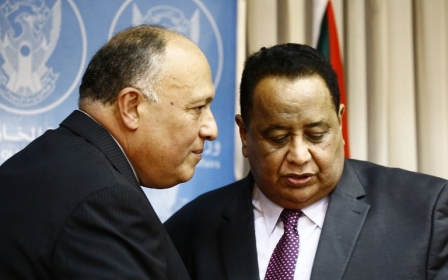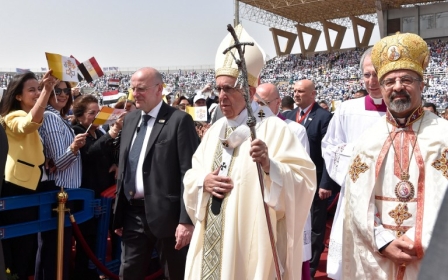Egypt's al-Azhar sacks head of university amid power games with Sisi

The head of Egypt's al-Azhar university, one of the world's leading Islamic seats of learning, has been replaced after labelling a controversial Muslim reformer an apostate, the institution said.
Ahmed Hosni Taha, the acting university president, had been forced to apologise on Thursday after saying reformer Islam al-Behairy was an "apostate" for attacking some of the founding scholars of Islamic law.
His apology was followed by a statement on Friday from al-Azhar saying that Grand Imam Ahmed al-Tayyeb, who heads the institution that runs the university, had replaced Taha.
Taha had made the remarks about Behairy during a television interview.
"My response ... was incorrect and it contradicts the way of al-Azhar," Taha said in an apology on the university's website.
Behairy is a talkshow host who has infuriated al-Azhar's traditional clergy with attacks on canonical religious books and some of Sunni Islam's most important scholars.
He has been central to a row between al-Azhar and Egypt's president, Abdel Fattah al-Sisi, who is pushing calls for reform that are not wanted by many within the institution.
Behairy was last year sentenced to a year in prison for "insulting religion," but was quickly released on a presidential pardon and has since vowed to continue to speak out against "radical thought".
Power struggle
Sisi first called for a "religious revolution" two years ago during a New Year's Day speech at al-Azhar, where he said "radicalised thinking is antagonising the entire world and tearing the umma [Islamic nation] apart".
A committee of education experts, created in 2015 at the behest of Sisi, has been reviewing and updating al-Azhar's educational curriculum to weed out content perceived to be inciting violence.
The calls were renewed after three Islamic State group suicide bombings of churches killed dozens of Coptic Christians in December and April.
Sisi said a committee would be formed to tackle the problems after Palm Sunday’s twin church bombings, which killed at least 45 Copts.
Al-Azhar has largely resisted Sisi's appeals to help "modernise the faith," including recent attempts by the government's religious endowments ministry to unify the content of Friday sermons nationwide.
Tayyeb reportedly instructed his aides to escalate their defence of the religious institution and its independence.
Al-Azhar also refused in February to back Sisi's call to amend divorce procedures and ban the Islamic practice of "verbal" divorce. Al-Azhar said the the practice was Sharia compliant.
Al-Azhar was slammed by local media, which accused Tayyeb and his Supreme Council of Scholars (SCC) of having affiliations with the Muslim Brotherhood despite the institution's support for the army's coup against Mohamed Morsi in June 2013.
Tayyeb was at Sisi's side when the then-defence minister told Egypt that Morsi had been removed from power on 3 July, 2013.
Politics and religion
Nathan Brown, a non-resident senior fellow at the Carnegie Endowment for International Peace, told Mada Masr that there was a politically driven conflict between government and religious leaders.
He said the government was hindered by a 2012 law change that allowed al-Azhar, rather than the government, to appoint its leaders in an effort to break the alleged bond between al-Azhar and the Brotherhood.
"The change made in al-Azhar's leadership structure by the Supreme Council of the Armed Forces was designed to keep al-Azhar independent from the Brotherhood, but it works regardless of who is president," Brown said.
"Tayyeb is in a far more independent position than his predecessor. Sisi is discovering this just like Morsi discovered it," Brown said.
Commenting on the amendments during a 2014 interview with Egyptian media, Tayyeb said: "We made sure al-Azhar remains an independent institution and that its sheikh is an independent figure."
According to Mohamed Medhat Mandour, a researcher in the law and society department at the American University in Cairo, al-Azhar wants to deliver a message to the presidency - "That the institution cannot control the religious sphere while it is too attached to the state, and that the state should give al-Azhar enough space to freely move" - he told Mada Masr.
Efforts initiated by Egyptian MP Mohamed Abu Hamed, who has also called for the reform of al-Azhar's teachings, may change the rules of the game.
Abu Hamed has been preparing amendments to the 2012 law that would bring al-Azhar back under state control and give the president the power to appoint both al-Azhar's grand sheikh and the Supreme Council of Scholars.
Stay informed with MEE's newsletters
Sign up to get the latest alerts, insights and analysis, starting with Turkey Unpacked
Middle East Eye delivers independent and unrivalled coverage and analysis of the Middle East, North Africa and beyond. To learn more about republishing this content and the associated fees, please fill out this form. More about MEE can be found here.





